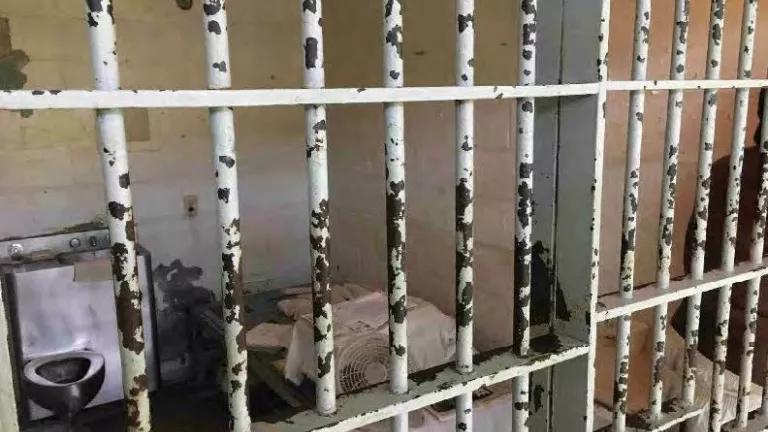Connecting Communities and Science at American Geophysical Union 2020

Environmental pollution is not experienced equally in the United States: Low-income communities and communities of color face disproportionately high levels of toxic air pollution and other environmental hazards. What’s more, these communities are also more vulnerable to the health impacts of that pollution due to other social conditions they experience, such as living in underserved neighborhoods, encountering racial discrimination and segregation, and having a lower socioeconomic status. The compounding effects of social and environmental stressors on people’s health is known as cumulative impacts.
Researchers are now better able to characterize the cumulative impacts of environmental hazards—thanks to available geospatial data, new analytical methods, and, importantly, advocacy driven by the impacted communities. At the same time, decision makers are being called upon more and more to collect data, assess impacts, and address environmental health disparities.
At the American Geophysical Union’s virtual 2020 annual meeting, NRDC and the Union of Concerned Scientists co-convened a panel to connect researchers, communities, and decision makers to discuss how scientific evidence can be leveraged for policy solutions. Panel participants included community representatives from Centreville Citizens for Change, Concerned Pastors for Social Action, Delaware Concerned Residents for Environmental Justice, Environmental Justice Health Alliance for Chemical Policy Reform, Equity Legal Services, Lideres Campesinas, Metropolitan St. Louis Equal Housing & Opportunity Council, Newark Education Workers Caucus, and Newark Water Coalition.
The panel, “Science to Action: Understanding and Addressing the Community Health Disparities Resulting from Air Pollution and Other Environmental Risk Factors,” consisted of eight presentations that explored cumulative impacts data and policy solutions; the interdisciplinary nature of the environmental justice movement; pollution disparities along the lines of race and class; transparency in environmental data; and more. These sessions brought together communities, scientists, and state agencies, offering a more collaborative way forward to advance environmental justice.
The presentations can be found below, as well as on this UCS YouTube playlist.
Exploring the Intersection Between Social Vulnerability and Access to Clean Air, Safe Water, and Chemical-Free Environments
In “Unstable Ground,” we explore how communities with high social vulnerabilities are systemically denied the right to clean air, safe drinking water, and environments free of toxic chemicals. We examine the bedrock environmental laws that were established to preserve natural resources and protect all people in the United States—and the ways in which, without specific mechanisms in place to correct for structural inequities built on race and class, the benefits of these laws are not conferred equally in practice.
Presenter
Kristi Pullen Fedinick, interim chief science advisor and senior scientist at NRDC
NRDC’s partner organizations
Coming Clean
Concerned Pastors for Social Action
Environmental Justice Health Alliance for Chemical Policy Reform
Lideres Campesinas
Newark Education Workers Caucus
Newark Water Coalition
Cumulative Impacts Analysis in Maryland’s Environmental Permitting and Enforcement
In this session, we explore the environmental challenges affecting Maryland’s communities, which have long grappled with heavy industrial activity sited near residential neighborhoods. We showcase efforts led by public health experts and advocates to incorporate a cumulative impacts analysis—that is, an analysis that considers the ways in which environmental and social stressors compound one another—into regulatory decision-making. One such effort is a statewide environmental justice screening tool that would provide more comprehensive data on cumulative burdens and that could guide agencies to focus monitoring and enforcement in the most impacted neighborhoods.
Presenter
Darya Minovi, MPH, policy analyst at the Center for Progressive Reform
Bridging Science and Advocacy to Address Environmental Justice in Delaware
In “Environmental Justice for Delaware,” we examine the efforts of the Delaware Environmental Justice Community Partnership, a collaboration between community residents, environmental and social groups, state agencies, and elected officials to address environmental justice issues across the state of Delaware. The partnership formed following a report, coauthored by community groups, that highlighted the health risks for communities situated along Delaware’s industrial corridor. That report found that people of color and low-income people in Delaware faced greater health risks than white and more affluent Delaware communities due to their proximity to polluting industrial facilities and hazardous waste sites. This session explores the organizing principles and policy solutions sought by the partnership, which was founded with the understanding that a collective, collaborative effort would be the most effective way to advance environmental justice.
Presenter
Octavia “Penny” Dryden, partner at Delaware Concerned Residents for Environmental Justice and executive director at Community Housing and Empowerment Connections and its Delaware Environmental Justice Community Partnership
Members of the Delaware Environmental Justice Community Partnership
Clean Air Council
Community Housing and Empowerment Connections
Delaware Concerned Residents for Environmental Justice
Delaware-CTR ACCEL
Delaware Department of Natural Resources and Environmental Control
Delaware Department of Transportation
Delaware Division of Public Health
Minority Workforce Development Coalition
NAACP Delaware
New Castle County, Delaware
Sierra Club, Delaware Chapter
Socially Responsible Agriculture Project
Sussex Health Environmental Outreach Program
Presentation unavailable.
Advancing Air Quality Monitoring in Environmental Justice Communities of the South Coast Air Basin, California
In this session, we look at a new Southern California program for air quality monitoring. Across the Los Angeles region, many environmental justice communities breathe toxic air that’s polluted by freeways, railways, and refineries. This session examines the process to clean up air pollution through the “AB 617 community air monitoring program.” The program, launched in 2017, offers a model in which solutions to air quality concerns are developed jointly between local governments and impacted communities. In this session, we discuss this program, its monitoring approaches, and the value of community engagement.
Presenter
Steven Boddeker, air quality specialist at South Coast Air Quality Management District
Developments in Cumulative Impacts Analysis and Policies for Environmental Justice
In “Making the Most of Data,” we explore the concept of cumulative impacts, and how this environmental justice framework can be applied in policymaking. Cumulative impacts refers to the combination of multiple pollutants occurring at the same time as other sociodemographic conditions that further amplify the negative health impacts of those pollutants. While cumulative burdens have been a lived reality for many communities for decades, historically, the policy and regulatory responses have been lacking. In this session, we explore the new tools and analyses developed by researchers and community organizers to contribute to a better understanding of cumulative impacts. We also look at the innovative community-driven federal and state-level efforts to incorporate cumulative impacts analyses into policymaking. Lastly, we provide recommendations for scientists who may be interested in how their own research can help contribute to the promotion of environmental justice and health equity.
Presenters
Stephanie Herron, organizer at the Environmental Justice Health Alliance for Chemical Policy Reform
Yukyan Lam, staff scientist at NRDC
Environmental Justice and the Inadequacy of Federal, State, and Local Air Pollution Policies in Protecting Marginalized Communities
In “Unprotected and Underserved,” we examine the long-standing inequities in air pollution exposure and the shortcomings of federal policies that fail to consider the cumulative impacts of multiple sources of pollution. When policies regulate pollution sources on a facility-by-facility basis, they do not account for the combined impacts of those sources—leaving people, especially those in Black, Latino, and low-income communities, to grapple with high burdens of air pollution even when local facilities are compliant with applicable laws and policies. In this session, we look at federal policies, like the Clean Air Act, and recent policy changes, like the loosening of emissions standards under the Trump administration, that nominally seek to protect communities but, in fact, worsen existing inequalities. We also evaluate federal policies that offer promising solutions to advance environmental justice by improving monitoring and regulation to better protect people from the compounding effects of multiple pollution sources.
Presenters
Gretchen T. Goldman, research director of the Center for Science and Democracy at the Union of Concerned Scientists
Michele Roberts, national co-coordinator at the Environmental Justice Health Alliance for Chemical Policy Reform
How Scientific Activism, Legal Advocacy, and Community Organizing Address Environmental Inequalities in Centreville, Illinois
The sewage and stormwater infrastructure in Centreville—a black, elderly, low-income city in Illinois—has been neglected for decades. Residents see stormwater flooding damage the structure of their homes while sewage-contaminated water stands in their front yards. Yet despite a social and political system that has turned its back on them, Centreville residents are committed to their community. This session explores how the residents’ committee, Centreville Citizens for Change, has forged partnerships and spearheaded a community-driven campaign to find solutions to water issues. Featuring an interview with Cornelius Bennett, co-president of Centreville Citizens for Change, this session highlights both the challenges and the possibilities that come with participating across a multidisciplinary team of scientists, attorneys, historians, policy advocates, and communications specialists.
Presenters
Cornelius Bennett, co-president at Centreville Citizens for Change
José Antonio Constantine, assistant professor of Geosciences at Williams College
Meleah Geertsma, senior attorney at NRDC
Kalila Jackson, staff attorney at Metropolitan St. Louis Equal Housing & Opportunity Council
Nicole D. Nelson, executive director at Equity Legal Services
Developing Publicly Accessible Data Analytic Tools to Understand EPA’s COVID Policy on Environmental Enforcement
In this presentation, we look at the Environmental Data & Governance Initiative (EDGI)’s efforts to make data tools accessible and understandable to the public, as EDGI examined the implications of the Trump administration’s relaxing of Environmental Protection Agency (EPA) requirements. In March of 2020, EPA implemented a new nonenforcement policy that invited companies to stop monitoring and reporting for reasons related to COVID-19. EDGI, concerned about the water contamination and air pollution implications of this new policy—especially as the world faced a disease made worse by the same respiratory problems caused by exposure to air pollution—used data tools to assess the policy’s impacts. Here, we explore EDGI’s findings, the data tools they used, and how they collaborated with communities to make the data more accessible.
Presenters
Kelsey Breseman, data program lead of the Strategic Coordinating Committee at Environmental Data & Governance Initiative
Eric Nost, coordinating committee member, Environmental Data & Governance Initiative
Megan Raisle, research and data analyst at Environmental Data & Governance Initiative
Sara Wylie, assistant professor at Northeastern University and associate director of Community Group Engagement at Social Science Environmental Health Research Institute
Lourdes Vera, graduate research assistant at the Social Science Environmental Health Research Institute at Northeastern University
Presentation unavailable.
For more information on their work, visit the Environmental Data & Governance Initiative website or watch their webinar on Democratizing Environmental Data to learn more.



